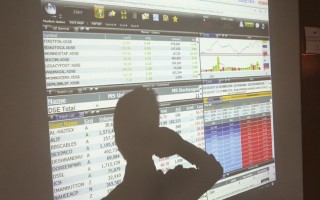Dhaka stocks hit 4.5-year low
Dhaka stocks on Monday plummeted to a four-and-half-year low as investors went into rampant sell-offs seeing no sign of recovery amid the government apathy towards the market, poor macroeconomic performance data and a financial sector mess.
The market has been in turmoil for 11 months causing the DSEX to fall by 1,826.52 points and the DSE market capitalisation to slump by more than Tk 1 lakh crore.
The DSEX, key index of the Dhaka Stock Exchange, lost 2.11 per cent, or 88.96 points, to close at 4,123.48 points on Monday after gaining 15.05 points in the previous session.
Monday’s index hit the 55-month low after May 7, 2015 when the index was 4,122 points.
The DSEX lost 336 points in the last seven sessions with only one positive day.
The market went into free fall from the beginning of the day that continued until the end of the session as investors rushed to offload their holdings to avoid pitfalls, market operators said.
The sales have amplified since December 5 amid the government’s apathy towards the capital market and decision to implement the 9-per cent lending rate from April 1.
They said that the market was going through a confidence crisis in the aftermath of a prolonged bearish trend in the market.
After a 13.75-per cent fall in 2018, the market witnessed another fall of 16.73 per cent in 2019 amid the lack of governance in the financial sectors, including the capital market, listing of poor companies, Grameenphone’s tussle with the telecom regulator and other economic troubles.
Despite knowing the situation, the government and the regulators did nothing to arrest the plunge that goaded the investors into searching for an exit from the market.
It has been a frustrating experience for investors as well as market intermediaries as they never had observed such a lengthy downward trend on the market before, market operators said.
The decline in the private sector credit growth to a nine-year low, negative export earnings in last four months, poor tax-revenue collection and heavy government borrowing were adding to the decline in investors’ confidence.
Dhaka University accounting department professor Mizanur Rahman told New Age on Monday that there was no transparency and accountability in the market resulting in lack of confidence among the investors.
The deterioration of macroeconomic indicators, including negative export data, lack of fund flow in the private sector and the poor tax-revenue collection, were unfavourable for the stock market, he said.
Mizanur said that the DSE’s tussle over appointing its managing director was another reason behind the fall.
Market experts said that widespread anomalies, falsification of financial statements, approval of initial public offerings by weak companies with huge placement shares, unpredictable regulations and no product diversification all gradually weakened the market.
Despite huge criticisms of the market regulator Bangladesh Securities and Exchange Commission over the approval for listing of the controversial Coppertech Industries, the commission did not back away from allowing Ring Shine Textiles to raise Tk 150 crore from the market.
The company is now trading its shares at Tk 8 each as investors have apprehended that Ring Shine would not be able to pay good dividend against its huge paid-up capital of Tk 500 crore or 50 crore shares.
The company had raised Tk 275 crore by issuing placement shares in 2018 before approaching for IPO approval.
A continued exodus of foreign investment came as a heavy drag on the market. The foreign investors withdrew Tk 980 crore over the last 10 consecutive months.
Market analysts said that the dispute between Grameenphone and the telecom regulator was becoming acute day by day, which was perceived as a reason behind the foreign investment outflow.
The Bangladesh Telecommunication Regulatory Commission on January 1 issued a show-cause notice on Grameenphone as the mobile operator took delivery of huge volumes of network equipment without regulatory approval.
The planned mandatory implementation of the 9-per cent lending rate fanned the flames of market volatility as it was feared to reduce the banks’ profits and the dividend for the shareholders.
EBL Securities in its daily market commentary said, ‘The investors had been suffering from a lack of confidence for a long time, while below par data on major macroeconomic indicators were dampening investors’ confidence badly.’
‘Coupled with that, GP’s tussle with the telecom regulator, fear over distressed earnings after single digit rate implementation in Banks, Capital flight from money market etc provoked investors to go for sell-offs repeatedly in last few weeks to avoid further losses on their portfolios,’ it said.
Trusted securities have also not been spared from the restlessness of the downward trend at the market as blue-chip index DS30, which groups 30 prominent companies, hit almost a seven-year low on Monday.
Share prices of Square Pharmaceuticals, Grameenphone, British American Tobacco and City Bank continued falling.
The turnover on the DSE increased slightly to Tk 286.77 crore on Monday from Tk 260.82 crore in the previous trading session.
Out of the 351 scrips traded on Monday, 313 declined, just 21 advanced and 20 remained unchanged.
The average share prices of all the sectors declined on the day.
The share prices of telecommunication, textile, non-bank financial institution and bank sectors declined by 4.6 per cent, 3.7 per cent, 3.2 per cent and 1.6 per cent respectively.
DSE blue-chip index DS30 dropped by 1.97 per cent, or 27.92 points, to close at 1,387.78 points.
Shariah index DSES shed 2.12 per cent, or 20.18 points, to end at 929.96 points.
LafargeHolcim Bangladesh led the turnover chart with its shares worth Tk 19.03 crore changing hands on the day.
News Courtesy: www.newagebd.net











